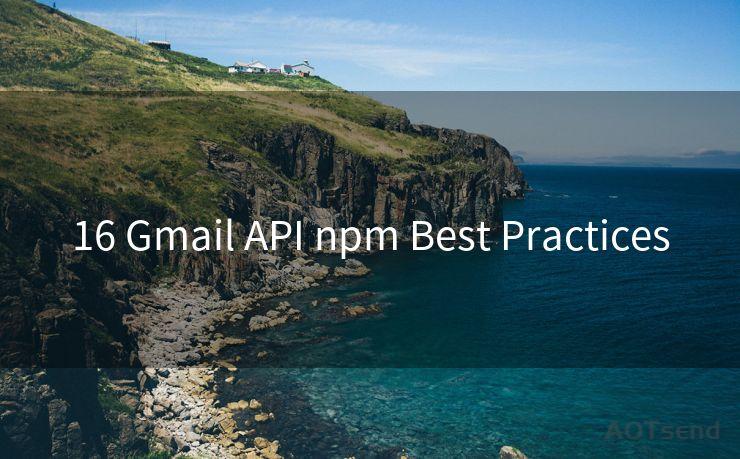16 Gmail API npm Best Practices




Introduction
The Gmail API provides a powerful interface for developers to interact with Gmail, enabling the creation of innovative applications that integrate with Google's popular email service. When combined with npm, a popular package manager for JavaScript, the possibilities are endless. In this article, we'll explore 16 best practices for using the Gmail API with npm, helping you to maximize efficiency and avoid common pitfalls.
1. Understand the Gmail API Basics
Before diving into development, it's crucial to understand the fundamentals of the Gmail API. Familiarize yourself with its various endpoints, authentication methods, and rate limits.
2. Set Up OAuth 2.0 Authentication
Proper authentication is essential for secure access to Gmail data. Use OAuth 2.0 to obtain access tokens and refresh tokens for secure API requests.
3. Manage Scopes Effectively
Scopes define the level of access your application has to a user's Gmail data. Only request the minimum scopes necessary for your application's functionality.
4. Utilize npm Packages Wisely
npm offers various packages that simplify working with the Gmail API. Choose packages that are well-maintained, have a good community, and provide the functionality you need.
5. Optimize API Requests
Minimize the number of API requests by batching operations and utilizing the Gmail API's ability to handle multiple requests in a single call.
6. Handle Errors Gracefully
Implement robust error handling mechanisms to manage API errors effectively. Use try-catch blocks, and provide meaningful feedback to users when errors occur.
7. Implement Exponential Backoff
To avoid overwhelming the Gmail API servers, implement exponential backoff strategies when retrying failed requests.
8. Monitor and Optimize Performance
Regularly monitor your application's performance, especially API response times, and optimize accordingly.
9. Secure Your Credentials
Protect your API keys and secrets. Never hardcode them into your application or expose them in public repositories.
10. Respect Rate Limits
Be mindful of Gmail API rate limits and adjust your application's behavior to avoid exceeding them.
11. Use Webhooks for Real-Time Updates
Utilize Gmail API's push notifications (webhooks) to receive real-time updates on changes to a user's mailbox, reducing unnecessary polling.
12. Keep Up to Date with API Changes
Regularly check the Gmail API documentation for updates and changes that might affect your application.
13. Test, Test, Test
Ensure your application is robust by conducting thorough testing, including unit tests, integration tests, and performance tests.
14. Document Your Code
Proper documentation helps other developers understand and maintain your code, especially when working with complex APIs.
15. Follow Gmail API Best Practices
🔔🔔🔔
【AOTsend Email API】:AOTsend is a Managed Email Service for sending transactional emails. Support Email Types: reminders, authentication, confirmations, notifications, verification codes, invoices, password resets, account activations, billing statements, two-factor authentication (2FA), and one-time passwords (OTP) emails, etc. $0.28 per 1000 Emails. 99% Delivery, 98% Inbox Rate.
You might be interested in:
Why did we start the AOTsend project, Brand Story?
What is a Managed Email API, How it Works?
Best 25+ Email Marketing Platforms (Authority,Keywords&Traffic Comparison)
Best 24+ Email Marketing Service (Price, Pros&Cons Comparison)
Email APIs vs SMTP: How they Works, Any Difference?
Google provides a set of best practices for using the Gmail API. Familiarize yourself with these guidelines and incorporate them into your development process.
16. Seek Community Support
Engage with the Gmail API and npm communities. These are great resources for solving problems and staying up to date with the latest developments.

Conclusion
By following these best practices, you can efficiently integrate the Gmail API into your npm-based projects, ensuring a smooth and secure user experience. Remember, the key to successful integration lies in understanding the API, managing authentication and scopes, optimizing requests, and staying engaged with the community.




Scan the QR code to access on your mobile device.
Copyright notice: This article is published by AotSend. Reproduction requires attribution.
Article Link:https://www.mailwot.com/p5616.html



